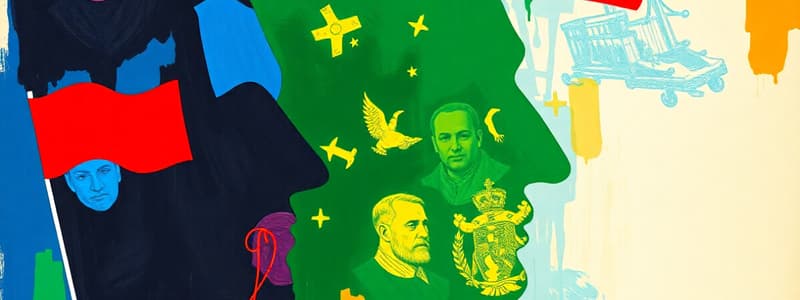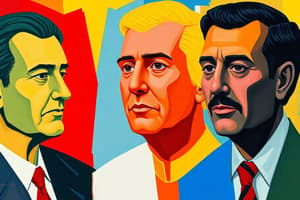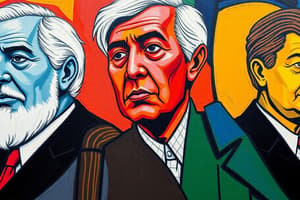Podcast
Questions and Answers
What campaign slogan did President Trump use that reflects his nationalist approach?
What campaign slogan did President Trump use that reflects his nationalist approach?
- Strong Together
- United We Stand
- Make America Great Again (correct)
- America First, Always
Which leader is associated with Hindu nationalism in India?
Which leader is associated with Hindu nationalism in India?
- Jair Bolsonaro
- Viktor Orbán
- Narendra Modi (correct)
- Xi Jinping
Which nation is led by a leader who has adopted Han-based nationalism?
Which nation is led by a leader who has adopted Han-based nationalism?
- China (correct)
- India
- Brazil
- Hungary
What was one outcome feared by some after the crumbling of the Soviet Union in 1989?
What was one outcome feared by some after the crumbling of the Soviet Union in 1989?
What ideology did Jair Bolsonaro borrow from Trump during his presidential campaign?
What ideology did Jair Bolsonaro borrow from Trump during his presidential campaign?
What was a crucial driver of regional political developments in the Balkans and Eastern Europe during the 1990s?
What was a crucial driver of regional political developments in the Balkans and Eastern Europe during the 1990s?
What common action did many countries take during the COVID-19 pandemic despite being part of the EU?
What common action did many countries take during the COVID-19 pandemic despite being part of the EU?
How did the COVID-19 pandemic demonstrate the nature of decision-making and citizen loyalty?
How did the COVID-19 pandemic demonstrate the nature of decision-making and citizen loyalty?
What assumption about progress and nationalism was proven mistaken in the mid-1990s?
What assumption about progress and nationalism was proven mistaken in the mid-1990s?
What did leaders often use as backdrops while addressing their citizens during the pandemic?
What did leaders often use as backdrops while addressing their citizens during the pandemic?
Study Notes
Nations and Nationalism in Comparative Perspective
- Nationalism is highly relevant in contemporary politics, more so than in past half-century
- The global rise of nationalism is particularly visible in the US, where President Trump's campaign focused on "America First" and "making America great again."
- Similar nationalist movements have gained power globally.
- Examples include Brazil, Hungary, India, and China, each exhibiting unique forms of nationalism.
- The historical narrative is central to national identity
Research Questions
- How and when are dominant national narratives formed?
- Does the invocation of national solidarity lead to denigration of other nations, minority suppression, and external aggression?
- Under what circumstances does the rise of nationalism create problems for democracy, economic development, migration policy, human rights, and global peace?
What Political Theory Says
- Political scientists generally agree that the nation is an imagined community.
- It's etymologically linked to "birth" and has an invented tradition.
- Individual membership is determined by practices, beliefs, or inherited attributes.
- Nationalism, is the celebration of the nation, encompassing a desire for political sovereignty over a defined territory.
- The political unit should align with the national unit.
- Nationalism is a collective sentiment that binds individuals through a shared sense of large-scale political solidarity.
- This sentiment is used to create/legitimize/challenge states.
The Global Reawakening of Nationalism
- Brazil's Jair Bolsonaro, borrowed Trump's nationalism campaign.
- Hungary's Viktor Orbán argues for national interests.
- Narendra Modi prominently champions Hindu nationalism in India.
- Xi Jinping, using Han-based nationalism, has become a powerful Chinese president.
Did History End in 1989?
- Following the collapse of the Soviet Union, democracy, capitalism, and globalization gained acceptance.
- The assumption that nationalism would be a historical relic was later proved wrong
- Nationalism fueled regional conflict after 1989, such as in the Balkans, Central and Eastern Europe, the former Soviet Union, and Latin America
The COVID-19 Pandemic
- The pandemic paradoxically highlighted the national nature of decision-making and citizen loyalty.
- Even within the EU, many countries closed their borders.
- National flags became prominent in the leader's addresses.
What Political Theory Says II
- Some prominent voices have criticized nationalism for erasing moral values or equating it with racism.
- Authors like Macron, Monbiot, and Roy have voiced these critiques.
In the 20th Century
- Reactions against nationalism echo 20th-century criticisms, including that it's mankind's "measles," "greatest evil," "chauvinism," and a "false god"
Is Nationalism Always Bad?
- Nationalism encompasses multiple forms, not always negative.
- National attachments can motivate great sacrifice for the public good.
- Nationalism is also an inspiration for movements for freedom and justice, such as in the American and French Revolutions, movements to overthrow absolute monarchies, and responses to colonial regimes
Non-Ethnic Nationalism
- Today, most government leaders use historical narratives to promote their power and policies.
- Some historical narratives are values-based, like Indonesia's.
- National identities are sometimes not solely based on ethnicity but on shared values (e.g., Canada).
- The research is still limited, and the analysis often privileges Western/European/American experiences.
US vs. Them
- All nationalisms distinguish between duties to citizens and non-citizens.
- Many contemporary nationalisms portray specific groups as second-class citizens (racial, religious or ethnic).
- Trump, Modi and Xi's leadership styles exemplified these stances
Nationalism vs. Bad Nationalism
- Exclusionary nationalism is problematic due to its negative consequences like the prevention of genocide, democracy and the provision of public goods.
- Nationalism is not inherently bad but exclusionary types present problems
A Gap in the Literature
- Scholars haven't consistently studied the diverse ways nationalism emerges
- There's a lack of consistent studies on how nationalism impacts outcomes of interest like democracy, peace, or economic development.
Comparative Political Science
- Comparative political science studies unique and varied national narratives.
- Generalizations from case studies like Catalonia and Basque Country are possible.
- A gap exists in the historical understanding of how nationalism has impacted specific regions and people.
Next Classes
- Critically analyze historical debates about nationalism's origins and formation
- Identify key trends in contemporary nationalism scholarship (comparative historical, behavioral/survey-based, observational/ethnographic approaches)
- Examine the insights from other disciplines, and pinpoint knowledge gaps
Studying That Suits You
Use AI to generate personalized quizzes and flashcards to suit your learning preferences.




